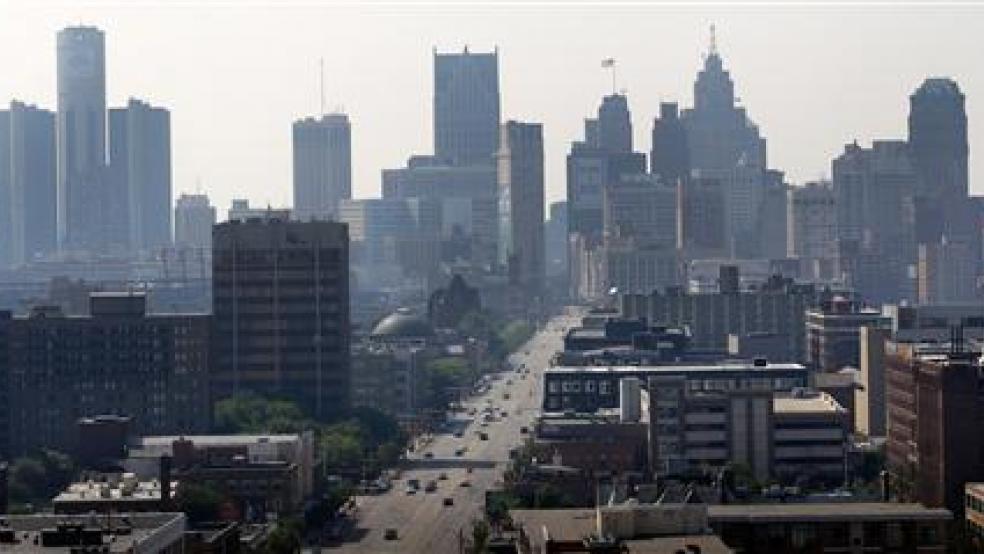In March 2015, the U.S. and Canadian governments reached an agreement to build a new $2.1 billion bridge connecting Detroit and Ontario designed to eliminate a massive bottleneck that for decades has put a crimp in the flow of commerce between the two countries.
The goal was to replace the 86-year-old Ambassador Bridge, a deteriorating, two-mile long relic of a bygone era in serious need of renovation.
Related: New $2.1 Billion Detroit-Windsor Bridge Promises Boon to U.S. Trade
Despite the initial optimism of Canadian and U.S. officials nearly 16 months ago, the project has become bogged down in complicated and time-consuming legal challenges. And Canadian and U.S. officials’ hopes of completing construction of a replacement bridge by 2020 now seem highly unrealistic.
Canada is by far this country’s biggest trading partner, with more than $650 billion in goods exchanged every year. That’s far more than U.S. trade with Mexico, China or Japan.
But with nearly half of all those goods transported back and forth between the two countries by truck, roughly $100 billion in goods must traverse the rickety Ambassador Bridge every year.
More than 8,000 trucks cross the bridge every day, with drivers spending on average three to four hours making the crossing. Some transportation experts say a modern replacement bridge would pave the way for a significant boost in trade in the coming years.
Related: Now It’s Detroit’s Turn for a High-Speed Comeback
That would carry important implications not only for Michigan’s economy but also for other rust belt states including Ohio, Indiana and Pennsylvania still struggling to recover from the recession.
“Among all the border crossings between Canada and the United States, Detroit is really the most emblematic of the infrastructure problems that need to be addressed,” Joseph Kane, a senior policy specialist on U.S. metropolitan areas, told The Fiscal Times shortly after the new bridge project was formally unveiled.
The new bridge – to be named for Canadian-born Gordie Howe, the late Detroit Red Wings hockey great -- is to be built across the Detroit River about two miles south of the Ambassador Bridge. The project, largely financed by Canada, will also include construction of new highway interchanges in downtown Detroit and Windsor to ease the crush of traffic.
But now there is considerable uncertainty over the timetable for the new project – and whether it will actually get off the ground.
Related: A Better Solution for Detroit’s Blight
Part of the problem stems from continued opposition from residents in nearby Southwest Detroit communities who fear the project would destroy their neighborhoods and harm the environment. They’ve gone to court, but have been repeatedly rebuffed until now. There also are questions about how the project would affect blighted neighborhoods across the river in Windsor.
But the biggest problem has been the legal challenge and maneuvering of Detroit area multi-billionaire Manuel “Matty” Moroun, the owner of the Ambassador Bridge.
The 89-year-old real estate and transportation mogul has owned the Ambassador Bridge since 1979 – making it the only privately owned border crossing between the U.S. and Canada.
Moroun, a powerful and highly combative businessman, has waged a relentless campaign to discourage competition and to protect his sizeable profits from operating is toll bridge and related retail gasoline sales.
In January 2012, he famously spent a night in jail rather than complying with a judge’s order to meet the terms of a contract with the state to build ramps connecting the Ambassador Bridge to nearby expressways as part of a project to reduce traffic congestion.
Related: Outraged Americans Want Immediate Action on Flint Water Crisis
More recently, Moroun and his family “have been pulling every lever to stall” the Gordie Howe bridge project, as The Washington Post reported recently. That effort has included litigation challenging the approval process of the new bridge “and asserting their singular right to operate a bridge traversing the two countries.”
At the same time, the Moroun family has been seeking permits and approval to build their own new bridge that would run parallel to the Ambassador Bridge. If they won approval of that project, it would effectively kill off the U.S.-Canadian bridge project.
Moroun’s intense opposition to the Gordie Howe Bridge is understandable. One study suggests he would lose 75 percent of his bridge’s annual revenues if the new bridge were built, while Canada alone would generate $70 million a year in revenues.
Thus far, Moroun’s challenges have been rejected by the courts, including a federal court decision two weeks ago that the crossing agreement between the U.S. and Canada was neither arbitrary nor illegal.
The Post says the Moroun family has more tricks up its sleeve, including buying up property in Detroit that will be necessary to complete the new bridge project. The government could eventually acquire that land through eminent domain, but it would add more time to the project.
And the family is certain to come up with more legal schemes to slow the new bridge project even further.





